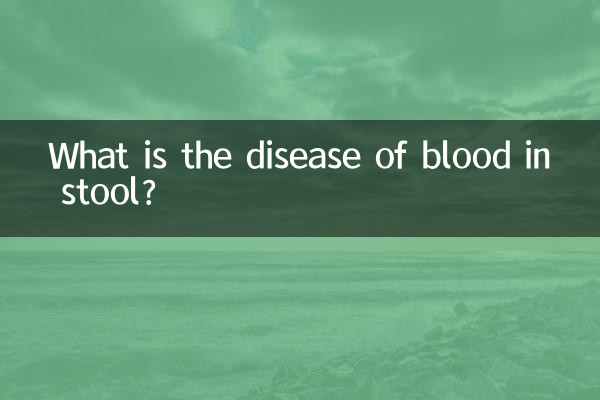What is the disease of blood in stool?
Blood in the stool is a common clinical symptom that may be caused by a variety of diseases. Recently, there has been a lot of discussion on the Internet about blood in stool, especially popular science content related to intestinal health, hemorrhoids, bowel cancer, etc. This article will combine hot topics and structured data in the past 10 days to provide you with a detailed analysis of the causes, symptoms and countermeasures of blood in the stool.
1. Common causes of blood in stool

There are many causes of blood in the stool, ranging from benign diseases to malignant tumors. The following are the causes that have been hotly discussed on the Internet in the past 10 days:
| Cause | Symptom characteristics | heat index |
|---|---|---|
| hemorrhoid | Bright red blood, blood dripping after defecation or blood on toilet paper | 85% |
| anal fissure | Severe pain during bowel movements and a small amount of bright red blood | 72% |
| intestinal polyps | Painless bloody stool, dark red blood | 68% |
| ulcerative colitis | Mucus, pus and bloody stools, accompanied by diarrhea and abdominal pain | 65% |
| colorectal cancer | Dark red bloody stools with changes in bowel habits | 90% |
2. Disease warning signs that have been hotly discussed recently
According to health topic data in the past 10 days, the following symptom combinations receive the most attention:
| Symptom combination | possible disease | Recommended medical urgency |
|---|---|---|
| Blood in the stool + weight loss | Colorectal cancer is more likely | seek medical attention immediately |
| Blood in the stool + abdominal pain + fever | Infectious enteritis or inflammatory bowel disease | Seek medical attention within 24 hours |
| Blood in the stool + anal pain | Hemorrhoids or anal fissures | Seek medical attention within 3 days |
| Blood in the stool + change in bowel habits | Intestinal tumor risk | seek medical attention immediately |
3. Inspection methods that are hotly discussed on the Internet
In the discussion on blood in stool examination methods in the past 10 days, the following examination methods have attracted the most attention:
| Check method | Applicable situations | Discussion popularity |
|---|---|---|
| Digital anal examination | Initial screening for low rectal lesions | 78% |
| Colonoscopy | Gold standard for diagnosis of total colon lesions | 95% |
| fecal occult blood test | Microbleed screening | 65% |
| CT colonography | Alternatives for those who cannot tolerate colonoscopy | 58% |
4. Prevention and self-management suggestions
In recent health science popularization, preventive measures for blood in the stool have also attracted much attention:
1.Diet modification:Increase dietary fiber intake, maintain 25-30 grams of fiber daily, and drink more water.
2.Bowel habits:Establish regular bowel movements and avoid prolonged sitting and excessive straining when going to the toilet.
3.Exercise suggestions:30 minutes of moderate-intensity exercise every day to promote intestinal peristalsis.
4.Screening of high-risk groups:People over 40 years old are recommended to undergo regular colonoscopy, and those with family history should pay more attention.
5.Symptom monitoring:Record the frequency, color changes and accompanying symptoms of blood in the stool to provide the doctor with a detailed medical history.
5. Selection of recent popular questions and answers
Based on medical consultation data in the past 10 days, the following are the most common questions about blood in the stool:
| question | Summary of professional answers |
|---|---|
| Do I need to worry about occasional blood in the stool? | Occasional bright red blood in the stool is mostly hemorrhoids, but repeated episodes still require medical attention |
| Is bloody but painless stool cancer? | Painless bloody stools may indicate high-level lesions, including polyps and tumors |
| Is the red stool blood after eating dragon fruit? | Food pigments can cause pseudoblood in the stool, which needs to be judged in conjunction with other symptoms |
| Will young people get bowel cancer if they have blood in their stools? | The incidence of bowel cancer in young people is rising, symptoms cannot be ignored |
6. Summary
Blood in the stool is a health warning sign that should not be ignored. According to recent hot topics of discussion on the Internet, public attention to intestinal health continues to rise, especially the awareness of early symptoms of colorectal cancer. Regardless of your age, if you have symptoms of blood in your stool, you should seek medical treatment promptly and obtain professional examination to determine the cause. At the same time, establishing a healthy lifestyle and regular physical examinations are effective ways to prevent serious intestinal diseases.
Special reminder: This article is based on recent Internet hot spots and is for reference only. Please follow your doctor's advice for specific diagnosis and treatment, and do not self-diagnose or take medication. If symptoms of blood in the stool occur, especially if accompanied by weight loss, persistent abdominal pain and other warning signs, be sure to seek medical treatment in time.

check the details

check the details